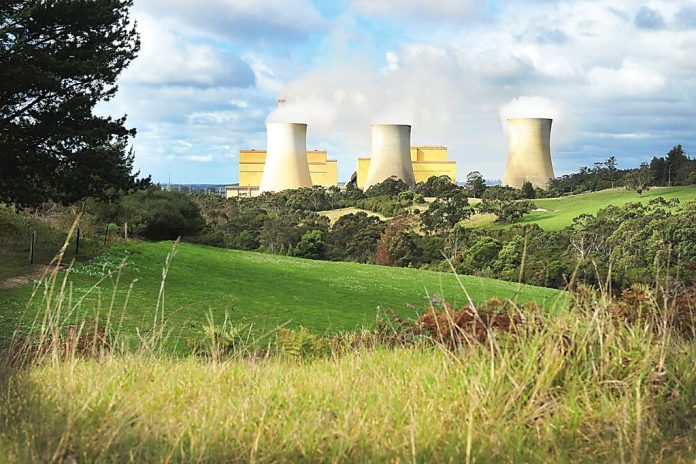ZAIDA GLIBANOVIC
By ZAIDA GLIBANOVIC
FOR over 15 years, the local Gippsland Trades and Labour Council have battled for a national energy transition authority and now their calls have been heard. Federal Climate Change and Emergency Minister Chris Bowen announced that the government would establish a Net Zero Authority. The energy minister made the announcement last Friday, May 5, on a visit to the retired Liddell power station in the Hunter Valley region. The federal government’s Net Zero Authority will ensure that workers, communities, and industries can manage the shift to a low-carbon economy. The Authority will seek to make the transition fair, coordinated and orderly and ensure economic opportunities for transition regions like the Latrobe Valley. “We want it to be a one-stop shop for those thinking of coming to regions like this to create new jobs, to create investment, to create jobs for the future,” said Mr Bowen. The calls for a national body to take charge in the energy transition have been constant and widespread among unions, industries, green activists and scholars. The National Net Zero Authority will start work on July 1, focusing on transitioning jobs away from coal. The federal government will also seek to write the new authority into law. The energy minister announced a $400 million funding package from the Powering the Regions Fund to be administered by the Australian Renewable Energy Agency. Speaking to Mark Richards, the Assistant Secretary of the Gippsland Trades and Labour Council he said, “It’s good to get recognition from the federal government that this (transition authority) is needed and that all states … are all pulling in the one direction in where we are going.” This announcement comes after the Australian Council of trades union (ACTU) and the GTLC renewed their call for a national energy transition body to help workers exit the fossil fuel industry in March, after years of advocacy. “We have been fighting for, believe it or not, over 15 years for something similar to this (energy authority)”, said Mr Richards. “I remember doing speeches in support of this in 2016 in Canberra, it’s taken this long period of time to get here finally, so it’s good to see we’ve finally got some traction and something to build on.” With the Yallourn W Power station set to close in 2028 and Loy Yang A power station to go in 2035, Mr Richards said, “It is Latrobe Valley under pressure right now, we will be followed by the Hunter Valley sometime in the future, so we are a key stakeholder in this.” According to the government, the body will be guided by three main principles: Support workers in emissions-intensive sectors to access new employment. Coordinate programs across all levels of government to support regions and communities to take on the advantages of new clean energy. Assist Investors and businesses to capitalise with net zero opportunities. Lisa Gooding, the Transition Leader of EnergyAustralia, expressed her admiration for the National Net Zero Authority. “It is important that the National Zero Emissions Authority helps create new jobs in advance of coal-fired power station closures so that our workers have roles to transition to,” she said. “To play our role, EnergyAustralia will support the retraining of interested Yallourn workers to transition to these new roles through our $10 million Yallourn Transition Program.” The Yallourn Transition Program offers personalised assistance to help the Yallourn workforce plan, prepare, and re-skill for a future beyond Yallourn. This includes customised career plans, support for any reasonable training indicated by the employee, personalised career counselling, financial advice and planning, small business seed money, linkages to job prospects, and redeployment aid. EnergyAutstralia are already reinvesting in clean energy across their operation. “EnergyAustralia is reinvesting in the regions in which we operate to create new clean energy opportunities. For example, we’re reinvesting in the Latrobe Valley through our Wooreen Battery Storage facility in Jeeralang and exploring opportunities to transform the Yallourn site so that it enables prosperity and amenity in the region for generations to come,” Ms Gooding said. The company remains hopeful that the authority will get into action so that a successful transition can be achieved that will make jobs and local training courses available so that their workers and communities will thrive. Australia’s turn toward clean energy has many stakeholders especially in our regional communities including farmers. The National Farmers’ Federation (NFF) has also embraced the announcement of the National Net Zero Authority, as farming communities will be among the most acutely impacted by Australia’s energy transition. NFF Chief Executive Tony Mahar said the Authority must look closely at the cumulative impacts of the energy transition on farm production. “When we talk about new renewable energy or new transmission lines, we’re talking about old farmland,” Mr Mahar explained. Mr Mahar said that already, poorly executed transmission line projects had become a major source of tension in rural communities. “What we’ve seen in recent years is energy companies riding roughshod over farmers, with token consultation and no care given to the role they play in feeding and clothing the population,” he added. “That has to stop. Farmland and the farmers who grow our food need to be valued and respected. I hope this new Authority can help bring some common sense into the frame. “A constructive and considerate partnership with farmers is central to delivering the Government’s Powering Australia Plan. “This new Authority will need to work closely with farmers to strike the right balance between hitting net zero, and maintaining our capacity to produce food and fibre.” Mr Mahar said the NFF is calling on the government to introduce an enforceable code of conduct to steer the practices of energy companies. “Clearly the ‘let it rip’ approach continues to fail. Just ask anyone in St Arnaud, Castra or Batlow. The power companies are abusing their authority at every step,” Mr Mahar said. “The federal government has a responsibility to level the playing field here before it embarks on a building spree on farmland across the country. We look forward to the new Authority being an important player in that.” The peak body for electricity, the Australian Energy Council’s Chief Executive, Sarah McNamara, welcomed the new authority though she reinforced the need for coordination with local and state governments. “Governments have a critical role to play in ensuring that communities are not left behind. To ensure public support for the energy market transition, we need strong engagement and cooperation across all levels of government, in industry and in the communities themselves,” Ms McNamara said. Ms McNamara also highlighted the importance of the authority working alongside the energy transition plans already in place regionally. “It will be important to avoid duplication and to harness the work underway on power plant sites, and in regional and state governments,” she added. “Our members are on the frontline of the shift away from coal-fired generation and are acutely aware of the challenges at a local level. We know that each community will be impacted differently.”










